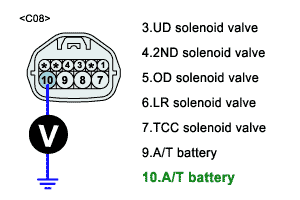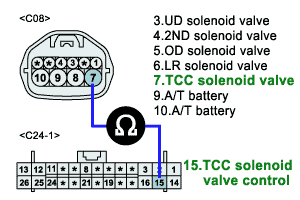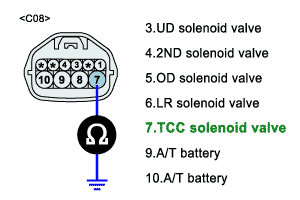Has a problem been found?
YES
Repair as necessary and go to "Verification of Vehicle Repair" procedure
NO
Go to "Power Circuit Inspection" procedure
Many malfunctions in the electrical system are caused by poor harness and terminals. Faults can also be caused by interference from other electrical systems, and mechanical or chemical damage.
Thoroughly check connectors for looseness, poor connection, bending, corrosion, contamination, deterioration, or damage.
Has a problem been found?
YES
Repair as necessary and go to "Verification of Vehicle Repair" procedure
NO
Go to "Power Circuit Inspection" procedure
Disconnect "A/T SOLENOID VALVE" connector.
Measure voltage between teminal"10" of the sensor harness connector and chassis ground.
Turn ignition switch OFF → ON
Specification: 12V is measured only for approx. 0.5sec

Is voltage within specifications?
YES
Go to "Signal Circuit Inspection" procedure
NO
Check that A/T-30A Fuse in engine room junction is installed or not blown.
Check for open in harness. Repair as necessary and Go to "Verification Vehicle Repair" procedure
Ignition "OFF"
Disconnect "A/T SOLENOID VALVE" connector and "PCM/TCM" connector
Measure resistance between terminal "7" of the ATM SOLENOID VALVE harness connector and terminal "15" of the TCM harness connector
Specification: approx. 0 Ω

Is resistance within specifications?
YES
Go to "Check signal circuit short Inspection" procedure
NO
Check for open in harness. Repair as necessary and Go to "Verification of Vehicle Repair" procedure
Engine "OFF".
Disconnect "A/T SOLENOID VALVE" connector and "PCM/TCM" connector
Measure resistance between terminal "7" of the ATM SOLENOID VALVE harness and chassis ground.
Specification: Infinite

Is resistance within specifications?
YES
Go to "Component Inspection" procedure
NO
Check for short to ground in harness. Repair as necessary and Go to "Verification Vehicle Repair" procedure